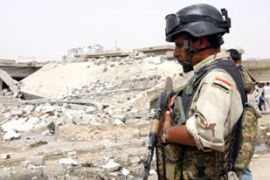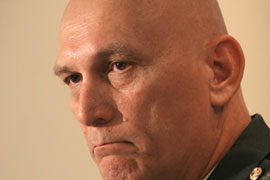US proposes northern Iraq patrols
US commander suggests joining with Iraqi and Kurdish forces to halt violence in north.

Odierno said he met Nuri al-Maliki, the Iraqi prime minister, earlier on Monday to discuss the possible deployment.
‘Tense situation’
Hassan al-Sineid, a Shia MP close to al-Maliki, welcomed the plan.
“This is a type of solution for the tense situation in the disputed territories between Kurds and Arabs,” he said.
| in depth | |||||||||
|
The Kurds want to bring oil-rich Kirkuk and several historically Kurdish areas of Nineveh under the control of their semi-autonomous region in the north of the country.
However, many of the Arabs and ethnic Turkmen who live in the areas want to remain under the direct control of Baghdad.
“We have al-Qaeda exploiting this fissure that you’re seeing between Arabs and Kurds,” Odierno said. “What we’re trying to do is close that fissure.”
He said that al-Qaida was targeting minorities, small towns that don’t have a police force and other so-called soft targets to avoid heavy security concentrated in more central areas.
Scores of people have been killed in attacks across the region in recent weeks and there were three reported bombings in the city of Mosul on Monday alone.
‘Neutral zones’
Odierno said that the planned deployment of the joint US-Iraqi-Kurdish forces would start in Ninevah province, which includes Mosul, and then extend to Kirkuk and to Diyala province north of the capital.
 |
| Odierno said that al-Qaeda was exploiting ‘fissures’ between Kurds and Arabs [AFP] |
However, in a sign of the problems the proposed depoyment could face, Atheel al-Nujaifi, the Sunni Arab governor of Nineveh province, said he would welcome US and Iraqi forces, but not the Kurds
“But since the Kurdish officials object to this idea, then I think there is no need for joint forces in these areas,” he said.
“The US soldiers could help turn these places into neutral zones.”
About 130,000 US troops remain in Iraq, but a brigade is set to leave the country by the end of August and not be replaced. The US
military has not yet specified how many troops would be left in Iraq at that point.
The security deal between deal requires all US forces to leave the country entirely by the end of 2011.
